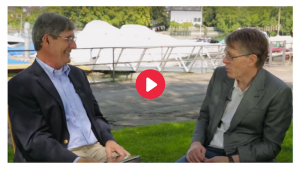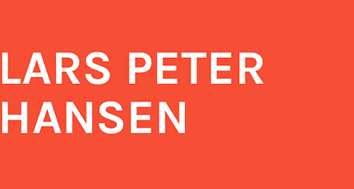Frequently Asked Questions
Many people are curious about Lars’ work and his views on a wide range of topics. Below are answers to some of the questions he is asked most frequently.
Q. How useful is economics?

Lars was asked this question while attending the Landau Nobel conference in 2013. “Well, I definitely think economics is useful,” he laughs. “This is what I do.” Watch his full response in the Landau video at right.
Q. What is the value of economics and how has it helped the average person?
Q. Your current work focuses on uncertainty. How do you see uncertainty as being relevant to economics today?
Politicians like to embrace economists who express their views with incredible confidence. That can be problematic because in a lot of cases that confidence is not real, or shouldn’t be real. And it’s not premised on solid evidence or necessarily solid analysis. It is opinion. It could be stated with great confidence, but if it’s opinion, it’s also good to ask, are there other opinions and if other opinions are consistent with the data and what are their ramifications? So, I do think there is a danger in having false confidence. And I think it can be very present and very evident in the policy arena.
The financial crisis exposed some gaps in our knowledge. There’s some basic things we don’t understand about how turbulence in financial markets spills over into the macroeconomy, and vice versa. But we do have to engage in some type of oversight of financial markets. It’s absolutely critical, especially when governments are propping up financial institutions.
One argument I’ve heard made is that since this is a complicated problem, this requires a complicated solution. But I would argue the opposite. Because it’s such a complicated problem and because there are so many things we don’t understand, the best approach is to do it with simplicity and transparency and worry about fine-tuning things once our knowledge base expands.
Q. The work that you won the Nobel Prize for is very technical and can be hard for the general public to understand. Could you briefly explain your work in lay terms that led to the prize?
Q. You have said you struggled as a high school student. What was that like? What advice do you have for young people?
It is true. In many ways, I was what some might call a faculty brat. We moved to Utah during high school when my father became provost at Utah State University. It was a culture shock for me, and I struggled to adjust. I was an average student. I came home one day with a report with double check marks and a note that said, “Does not respect authority.” Fortunately, my parents were incredibly patient with me.
When it came to college, I only applied to Utah State based on my high school performance, but I discovered real opportunities there. I met some great teachers who took a genuine interest in me and encouraged my talents and my thinking. One teacher said to me, “Look at your talents, figure out what you’re really interested in and do that.” Another professor designed an accelerated curriculum to get me ready for graduate school. Others helped me, too. They had a big influence on me.
My advice for young people would be that you don’t have to be this incredibly motivated student and go to a private school to succeed. The public school system can offer what you need to accomplish special things. Pursue the opportunities presented to you.
Q. What has it been like to win the Nobel Prize?
It was of course exciting and has been very gratifying. Because of the prize, I suddenly began receiving more attention. I tell people, I’m the same person I was before the prize. But somehow you’re treated differently, as if your IQ just jumped by 40 points. So that part of the experience was interesting along some dimensions. I go to public events now and people want to talk to me, but before, they were happy to ignore me. And that’s okay. I think it’s an opportunity, too.
I’ve been very lucky over the years to have great graduate students. In 2013, they held a conference in my honor before I went to Stockholm, and I had the opportunity to see about 60 of my students who I served as a formal adviser to and well over 100 students whose committees I served on. Just seeing them out in the world, pursuing a wide variety of important research, that was very gratifying.
Whatever attention I have going forward, I’d like to use it to help draw attention to and nurture young scholars in the fields that are of great interest to me. If I can not only continue to make my own advances but also help them to become more effective advocates for important lines of research, then I think that’s probably the best I can do.
Q. Can you recommend a stock or give investing advice?
My wife and I are cautious investors. We believe that well-diversified portfolios are the way to go. We are not into stock-picking.
